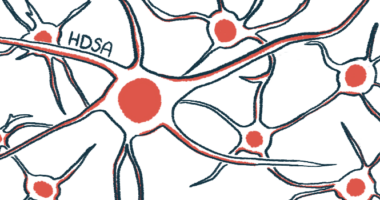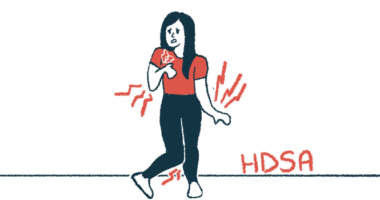Aripiprazole for Huntington’s disease
Last updated July 15, 2024, by Marisa Wexler, MS

What is aripiprazole for Huntington’s disease?
Aripiprazole is a second-generation antipsychotic approved by the U.S. Food and Drug Administration for certain psychiatric conditions. Among them are depression; schizophrenia, which is marked by a disconnection from reality; bipolar disorder, which is characterized by extreme mood swings; autism-associated irritability; and Tourette’s syndrome, which is marked by involuntary sounds and movements.
In people with Huntington’s disease, the therapy may sometimes be prescribed to help manage depression, and also used off-label for other symptoms — including psychosis and chorea, or uncontrolled, jerky movements by patients — of the neurodegenerative condition. For chorea, aripiprazole may be used in patients for whom approved anti-chorea treatments are contraindicated, or when these fail to control symptoms and can also help with psychiatric symptoms.
The therapy, available in both oral and injection forms, was originally developed by Otsuka, which markets it under the brand name Abilify for the oral formulations, and as Abilify Maintena and Abilify Asimtufii for the injectable form. There are also more than two dozen generic versions of oral aripiprazole available in the U.S.
Therapy snapshot
| Treatment name: | Aripiprazole |
| Administration: | Oral tablets or solution, and injection into the muscle |
| Usage: | Used off-label in Huntington’s to treat psychosis, depression, and chorea |
How does aripiprazole work?
Huntington’s is a genetic disorder caused by mutations in the HTT gene, which lead neurons, or nerve cells, in the brain to sicken and die. The dysfunction and death of neurons lead to problems with normal brain signaling that ultimately give rise to disease symptoms, including movement disorders and psychiatric issues.
Aripiprazole is a second-generation, or atypical, antipsychotic medication, meaning that it is less likely to cause certain side effects, such as movement abnormalities.
The exact mechanism by which aripiprazole works is not fully understood, but the therapy is known to modulate the activity of dopamine and serotonin, two neurotransmitters that play important roles in regulating processes like movement and emotion.
Neurotransmitters are chemicals that neurons release in order to communicate with each other. One neuron will release one or more neurotransmitters, which bind to specialized receptor proteins at the surface of neighboring neurons, activating specific signaling pathways.
Specifically, aripiprazole partially activates a dopamine receptor called D2 and a serotonin receptor called 5-HT1A, while blocking the activity of a different receptor for serotonin, called 5-HT2A. The therapy is therefore considered a stabilizer of serotonin, as well as of dopamine — acting as a suppressor when dopamine levels are high, and having no effect when dopamine levels are normal.
By regulating or normalizing dopamine and serotonin signaling in the brain, the therapy may ease emotional and motor problems associated with abnormal levels of these neurotransmitters.
The use of aripiprazole in Huntington’s patients has been reported only in small case series or case studies. Available data suggest that the therapy may lessen both psychotic and motor symptoms, as well as improve cognitive function. A small study also described a similar anti-chorea effect between aripiprazole and Xenazine (tetrabenazine), a medication approved to treat Huntington’s-associated chorea.
How is aripiprazole administered?
Several different forms of aripiprazole are available. These are:
- oral tablets, available at doses of 2 mg, 5 mg, 10 mg, 15 mg, 20 mg, and 30 mg
- an oral solution that contains 1 mg of the therapy per milliliter of liquid
- an extended-release injectable suspension, available in single-dose vials or pre-filled syringes containing 300 mg, 400 mg, 720 mg, or 960 mg of the therapy.
The recommended starting dose of oral aripiprazole — which is indicated for schizophrenia, bipolar disorder, depression, autism-associated irritability, and Tourette’s syndrome — depends on the condition being treated. The dose can then be adjusted based on how each patient responds.
For example, in adults with schizophrenia or bipolar disorder, the recommended starting dose is often 10 or 15 mg/day, whereas in adults with depression who are already taking an antidepressant, the recommended starting dose is 2 to 5 mg/day.
In the few studies reporting the use of oral aripiprazole in Huntington’s patients, symptom relief was reported at doses ranging from 7.5 mg/day to 30 mg/day.
The injection version of aripiprazole, administered by a healthcare professional, is specifically indicated to treat schizophrenia or bipolar mania in adults. The recommended dose is 400 mg monthly for Abilify Maintena and 960 mg once every two months for Abilify Asimtufii. Lower doses may be given if patients experience adverse events.
Dose adjustments may be needed for patients known to have poor activity of certain liver enzymes known to metabolize medications such as aripiprazole, or for those who are taking simultaneous medications that are known to influence the activity of such enzymes.
Common side effects of aripiprazole
Common side effects of aripiprazole in studies involving people with conditions for which it is indicated, but not specifically Huntington’s, include:
- sedation, sleepiness, or fatigue
- restlessness
- tremor
- extrapyramidal signs, which can include slow movements, involuntary movements, and abnormal muscle tone
- insomnia
- constipation
- nausea
- blurred vision
- changes in appetite
- abnormal drooling or saliva production
- injection site reactions (for the injectable formulation).
Mortality risk in elderly people with dementia-related psychosis
The prescribing information for aripiprazole carries a boxed warning noting it may increase the risk of death in elderly patients who have psychosis related to dementia. In clinical trials of elderly patients with dementia-related psychosis, the therapy was shown to increase the risk of life-threatening cardiovascular events like stroke.
Aripiprazole is not approved to treat dementia-related psychosis. However, if the therapy is being considered for elderly individuals with that condition, such patients should also be assessed for excessive sleepiness and swallowing issues, which may increase the risk of potentially life-threatening issues like accidents and choking.
Suicidality
Aripiprazole’s boxed warning also notes that it may increase the risk of suicidal thoughts and behaviors, as can antidepressants in general in people with depression. Suicidal thoughts also are common among people with depression or bipolar disorder.
Patients taking aripiprazole should be monitored for changes in mood or behavior, especially in the first few months after starting treatment and at times of dose changes. If irritability, agitation, behavior changes, and suicidal thoughts or behaviors arise, these symptoms should be reported to healthcare providers immediately, and the medication may be discontinued.
Because of the risk for suicidal behaviors, prescriptions of aripiprazole should include the smallest quantity that can reasonably be given at a time, to minimize the chances of overdose.
Cognitive and motor problems
Similar to other antipsychotics, aripiprazole can affect one’s judgment and cause side effects like sleepiness and movement issues. As such, people on the therapy may have an increased risk of falls, and should therefore be regularly assessed for fall risk.
Similarly, patients taking aripiprazole should not drive or operate dangerous machinery unless they have been on the therapy long enough to be reasonably certain they are not experiencing side effects that could make these situations dangerous.
In addition, people treated with aripiprazole may experience uncontrollable, compulsive urges. The most common urges are related to gambling, but they also can be related to sexual desire, eating, shopping, and so on. Because patients themselves might not feel like these urges are abnormal, providers should carefully ask about potential abnormal urges, and if any such urges develop, the dose may be reduced or treatment may be discontinued.
Tardive dyskinesia
Antipsychotic medications can cause tardive dyskinesia, a condition marked by persistent, uncontrollable movements in the face, tongue, and other body parts. Sometimes tardive dyskinesia stops if the medication is withdrawn, but sometimes this movement disorder remains even after discontinuing treatment. Also of note, antipsychotics themselves can ease symptoms of tardive dyskinesia, potentially masking the disorder in patients on treatment.
The risk of tardive dyskinesia is thought to be higher in patients treated for longer periods at higher doses; aripiprazole should be prescribed in a manner to minimize this side effect. If tardive dyskinesia develops, discontinuation of aripiprazole should be considered.
Swallowing difficulties
Aripiprazole and other antipsychotics may increase the risk of swallowing difficulties, known as dysphagia, which already are common in Huntington’s patients. This impairment can lead to aspiration, which occurs when food or water goes down the airway into the lungs, that can in turn set the stage for pneumonia. The medication should be used cautiously in patients at risk of aspiration pneumonia.
Metabolic changes
Aripiprazole and other atypical antipsychotic medications can cause changes in metabolism such as high blood sugar, abnormal levels of fatty molecules in the blood, and weight gain. Patients taking this medication should undergo regular monitoring of metabolic function.
Seizures and convulsions
Using aripiprazole may increase a person’s risk of seizures and convulsions. Thus, it should be used with caution in patients with a history of seizures or with conditions that may increase seizure risk.
Body temperature
Antipsychotics like aripiprazole may disrupt the body’s ability to regulate its temperature. As such, the therapy should be used with caution in patients in situations that may lead to a dangerous increase in body temperature. This may include living in hot parts of the world or getting a lot of strenuous exercise.
Use during pregnancy and breastfeeding
A registry study is collecting data from people exposed to aripiprazole and other atypical antipsychotics during pregnancy; it can be reached online or by phone at 1-866-961-2388.
Available data to date suggest that the use of aripiprazole during pregnancy does not increase the risk of major birth defects, miscarriage, or other major health problems for the fetus or the pregnant person.
However, there have been reports of extrapyramidal and/or withdrawal symptoms — such as abnormal muscle tone, tremor, agitation, sleepiness, difficulty feeding, or difficulty breathing — in newborns exposed to aripiprazole in the later stages of pregnancy. Some babies recovered in hours or days without specific treatment, but others have required more intensive care.
Aripiprazole is present in small amounts in human breast milk, and there have been reports of inadequate milk supply and poor infant weight gain when the therapy is used by people who are lactating.
Patients who are pregnant or nursing, or who plan to become pregnant or breastfeed, should discuss this topic with their healthcare providers, carefully weighing the potential risks and benefits of treatment in these situations.
Huntington’s Disease News is strictly a news and information website about the disease. It does not provide medical advice, diagnosis or treatment. This content is not intended to be a substitute for professional medical advice, diagnosis, or treatment. Always seek the advice of your physician or other qualified health provider with any questions you may have regarding a medical condition. Never disregard professional medical advice or delay in seeking it because of something you have read on this website.
Recent Posts
- What I want medical students to know about Huntington’s and bias
- Ingrezza treatment eases disease burden due to Huntington’s chorea
- A murder trial opened my eyes about Huntington’s and face reading
- What I want people to stop saying about Huntington’s disease
- HDSA 2025: Dance classes may improve balance in Huntington’s
- HDSA 2025: Long-term care transition requires communication
- Guest Voice: Huntington’s disease is rare, but love isn’t
- HDSA 2025: Observational studies in Huntington’s now enrolling in US
- HDSA 2025: Speakers spotlight Huntington’s clinical trials
- HDSA 2025: Speech therapy can help Huntington’s disease patients
Related articles





